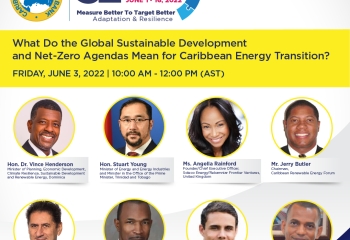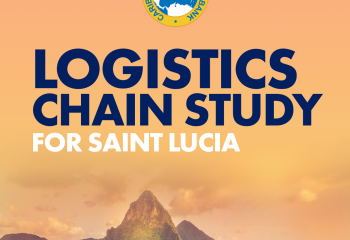2019 Annual News Conference- Dr. Justin Ram
St. Michael
Barbados

Good Morning to members of the media, colleagues, ladies and gentlemen, viewers online.
In 2018, the Caribbean Region continued to face the challenges of low growth, high debt, and high unemployment, which have persistently resulted in weak social outcomes. Such challenges are linked to inherent vulnerabilities related to size, trade concentration, poor governance, capacity shortages, rising crime and citizen insecurity. These factors have slowed transformation.
The situation has been compounded and complicated by climate change, as well as by increasing uncertainty surrounding the global economy.
This morning, I am going to share some details on these challenges, and outline how the countries have been responding, how CDB has been supporting, and indicate the gaps that need to be closed.
Last year, CDB published a study entitled, “A Policy Blueprint for Caribbean Economies”, which discussed how these challenges are interrelated, and lead to the persistent weak social outcomes I mentioned earlier.
The document also stressed the urgent need for reform and action to build macroeconomic resilience, environmental sustainability, productivity and competitiveness, and human capacity.
In undertaking the research, we leveraged our strong relationships with Borrowing Members and development partners, to ensure that the research responded directly to the needs of the countries and positioned them to deliver better results.
Allow me to turn my attention to environmental sustainability. Damage from the 2017 Hurricane Season was estimated at almost US$100 billion. In the British Virgin Islands (BVI) damage and losses from Hurricanes Irma and Maria exceeded 300% of Gross Domestic Product (GDP). In Anguilla, damage from Hurricane Irma approached 100% of GDP. Amidst the fallout from each event, CDB partnered with affected Borrowing Member Countries (BMCs) to assist with recovery and rebuilding.
The Government of the Virgin Islands received support from CDB in the immediate aftermath of the Hurricanes and in the next phase of recovery. An emergency relief loan of US67 million was approved in December 2017. This intervention was supplemented by a US$50 million exogenous-shock, policy-based loan (PBL) in March 2018. CDB’s support aims to strengthen fiscal management, enhance governance and labour-market flexibility, improve social resilience, and strengthen disaster management and climate resilience.
CDB was also well positioned to give similar support to Anguilla. Once again, having approved emergency assistance, the Bank made a loan to the Government of Anguilla of US$5.6 million to meet external debt payments. It provided a liquidity buffer for post-Hurricane rehabilitation during 2018, allowing for focus on the critical social and economic needs of the country.
A US$9.3 million PBL followed, which was the first of a proposed programme of PBLs, to implement reforms, which aim to restore fiscal sustainability and increase resilience against natural disasters.
During 2018, economic and financial volatility and uncertainties were also at play in a number of BMCs. As such, building economic and fiscal resilience and the shoring-up of financial buffers were high priorities of the Borrowing Members and the Bank. One such partnership that sought to directly target the restoration of economic and fiscal resilience was with the Government of Barbados.
As you heard from the President, in October 2018, CDB provided a US75 million loan to Barbados to support the implementation of the Barbados Economic Recovery and Transformation Programme, or BERT. Since 2016, CDB had been working with the Government of Barbados and international financial institutions to assess the macroeconomic situation in the country and identify solutions to its challenges.
The support to BERT was therefore built on three pillars: Fiscal Sustainability, Institutional Reforms for Growth and Social Protection.
The Programme signalled the Government’s commitment to address the country’s unsustainably high level of debt; as well as to chart a path for the transformation of the economy to improve the wellbeing of its citizens.
In addition, the Bank was able to leverage the experience gained in crafting solutions to similar problems in countries like Grenada, Jamaica, and St. Kitts and Nevis.
This engagement led to the approval of part one of a proposed series of PBLs to support BERT.
I will now share with you some of the expected outcomes and results. This series of PBLs aims to improve the business environment in order to position the economy for stronger growth over the medium term and to improve social protection, particularly for disadvantaged groups. The Government of Barbados intends to reduce debt levels from an unsustainable level of 170% of GDP in 2017 to 60% of GDP by 2033. At the end of 2018, debt levels had already declined to 127%.
Let me now discuss one of the major challenges of our region. One reason why our development goals tend to be difficult to achieve is that transformation in this Region is usually a slow process.
Implementation rates for public projects are as low as 20% in some countries. In 2017, the Bank was keen to better understand, and propose solutions for addressing these implementation challenges. In doing so, we investigated regional and global best practices for achieving quicker and better development results. The findings of our investigations, are reflected in the publication, “Implementation: Delivering Results to Transform Caribbean Society”. Discussions at the Bank’s first Caribbean Leadership and Transformation Forum also informed the study.
It is against this backdrop that the Government of Saint Lucia approached us to determine how it might best be able to deliver on its national transformation agenda. Consequently, CDB is now supporting a US$5 million project that seeks to assist the Government in establishing an Implementation and Delivery Mechanism.
This is expected to help the Government meet its priorities in six areas: Tourism, Agriculture, Infrastructure, Citizen Security, Education, and Healthcare.
Other BMCs have also expressed interest in developing similar mechanisms. CDB therefore proposes to assist with the development of country-specific solutions throughout 2019.
Much of the conversation today has focused on what CDB is doing to help our borrowing members build resilience in all of its forms.
Taking it a step further, this year, the Bank proposes to publish research that focuses on assessing and measuring the vulnerability and resilience of our BMCs.
This work will improve the measurement and, therefore, the utility of the index as one of the tools CDB uses to allocate our most concessional resources.
Furthermore, this new research is expected to inform our country engagements regarding resilience-building.
As we support this resilience-building, we will also seize opportunities to exploit our resources to better support economic growth.
Last year, we published research that focused on financing the development of the Caribbean Blue Economy. In this body of work, we put forward a proposal to better leverage our seas and coastal assets for sustainable economic development, and social and environmental resilience. Our BMCs are already taking advantage of the findings, to identify viable blue economy projects for implementation.
CDB’s Borrowing Members can also expect to benefit from ongoing research on digital transformation and an analysis of regional energy markets, scheduled for publication later this year. These two areas offer significant potential for transforming Caribbean economies.
Why do we say this? Transformation requires fiscal disclipine, human development, environmental resilience and an improved business environment. Our publications seek to provide our policy makers with the tools needed to chart this transformational path.
Rest assured that in 2019, we will continue to carry out research and give policy advice that is relevant and of a high quality, providing pathways to solutions that meet the needs of our citizens.





